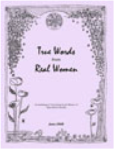 This is the fifth in a series of six posts by Matilda Butler.
This is the fifth in a series of six posts by Matilda Butler.
This reflection on the Tao of Memoir Writing begins with an understanding that not all stories are created equal. Some vignettes we write evoke pleasant memories. It is tempting to tell these stories as if we are still experiencing them. Other vignettes evoke quite the opposite memories. When we tell these stories, we want to “keep our distance.” Consider:
Too close or too far away, we cannot see clearly.
There is a best distance for recalling each event of our lives.
Some stories may be pure delight; they invite us to recount them from an intimate distance. Yet if we stand too close, we may miss their meaning.
Other stories may be too painful to tell without distance, without a narrator’s voice that lets us step outside the situation. Yet if we are too far away, we may lose sight of the emotional and factual truths hidden within.
TAO OF MEMOIR WRITING TIP: We write memoirs for many reasons. But a common outcome across all the reasons for starting is a better understanding of ourselves at the ending.
A TAO TRY THIS: Take a magazine article. Hold it up so that it almost touches your eye. What do you see? Take that same article and put it on the other side of the room. Now walk back to where you usually sit. What do you see?
If you do this exercise, you’ll understand what we mean in this Tao of Memoir Writing. “Too close or too far away, we cannot see clearly.” When the article was next to your eye, you couldn’t make out a single word, possibly not even a single letter. The parallel in memoir writing is the story when you include many details but forget to bring out why it mattered.
When the article was across the room, you couldn’t read words. In memoir writing, this is the equivalent of crafting a vignette in such a remote way that the reader wonders why you bothered to include it. Again, to “see clearly” our lives, we need to write at the mid-range, neither too close nor too far away.
This is not to say we write about all events in the same way or from the same distance. Be prepared to move in as close as comfort allows. But before you conclude your story, move back. Put the story in context. Consider its impact on your life.
TAO OF MEMOIR WRITING PROMPT: Write a paragraph about an event or person in your life. The first time, lavish details on this vignette. Get as close as you can. The second time, write with coldness and detachment. Reflect on how you feel after each effort. Write a second paragraph for each version. In the second paragraph take the story and put it in context, personal, cultural, or historical. Give the vignette perspective, personal perspective. How did you feel? How did it change you?
As you write your memoir consider the implication for you and your reader of writing at various distances from the story.
by Matilda Butler






I’m enjoying this series. From a book in the making?
On Sep 22, 2016 5:03 AM, “Telling HerStories: The Broad View” wrote:
> Matilda Butler posted: “This is the fifth in a series of six posts by > Matilda Butler. This reflection on the Tao of Memoir Writing begins with an > understanding that not all stories are created equal. Some vignettes we > write evoke pleasant memories. It is tempting to tell th” >
Hi Janet: These Tao of Memoir Writing posts come from a series of thoughts and reflections on memoir writing. Not part of a book. Just for the enjoyment of others engaged in memoir writing. Glad you are finding them interesting. One more to come…
I love this…I’m preparing to ghostwrite a memoir and I’m going to show these posts to my client to help her prepare for the process…
Thanks for your comment. Congratulations on the ghostwriting assignment. I know you will enjoy the process and it sounds as if you are already thinking how to make this effort valuable to the client in ways beyond a finished memoir. I appreciate you taking the time to read these posts. Best wishes with your writing.